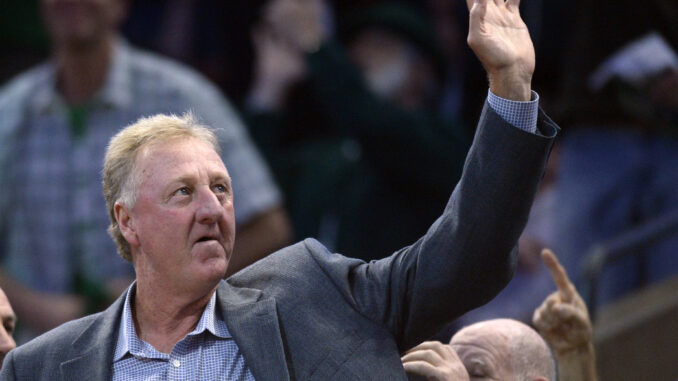
“You can’t spend 12 days at one thing and say it was the best time of your life” – Larry Bird confessed his basketball was over as soon as he left the Boston Celtics
Every professional athlete aspires to conclude his career on a high note, and Larry Bird is often perceived as having achieved that by winning an Olympic gold medal to conclude his time as a player. While the three-time MVP was indeed grateful for the opportunity to represent his country at 35 and be a part of such a star-studded group, he didn’t view it as his career’s pinnacle. Instead, for the Indiana native, his professional journey effectively concluded when he left the Boston Celtics.
Larry was happy to represent his country
Though he possessed plenty of game-changing ability until his last moment on the hardwood, injuries took their toll on Bird during the latter phase of his NBA career. The 1991-92 season seemed to signal the end of his playing days, as he participated in only 45 regular-season games and saw his team eliminated in the second round of the playoffs.
However, Larry found himself thrust into a leadership role on the Dream Team, serving as the co-captain alongside Magic Johnson. Even during the Olympic Games, the two-time Finals MVP made his presence felt, averaging 8.4 points off the bench and mending his longtime rivalry with Patrick Ewing. While this experience was ‘special’ for Bird, it was not the same as wearing Celtics green.
“I was 35, and it was a great honor, to play for your country,” Bird told Bob Ryan. “You can’t spend 12 days at one thing and say it was the best time of your life. Those 13 years with the Celtics were the greatest time of my life.”
Basketball was over for Bird the moment he left the Celtics
While Michael Jordan’s competitive nature was widely recognized, Bird possessed a similar relentless drive to excel. The three-time NBA champion’s determination to be the best was a defining characteristic. Given that the Dream Team registered a historic performance, scoring over 100 points in every game and averaging 117.3 points with a 43.8-point victory margin, the spotlight primarily fell on players like Charles Barkley, who led the team in scoring, and MJ, who averaged 14.9 points per game.
Bird, accustomed to being the center of attention throughout his career, found himself in a peculiar position. Though the 12-time All-Star recognized his fortune in being a part of this star-studded roster despite being past his prime, for him, no level of dominance could ever surpass the achievements he experienced with the Celtics during the ‘80s.
“When I left the Celtics, I left basketball,” Bird added. “My career ended when I left the Boston Celtics.”
Be the first to comment